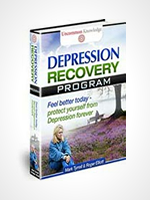The Physical Effects of Depression
ONE OF THE main reasons depression is often considered a disease is because of the all-too-real physical effects of depression suffered by depressed people.
These physical signs help us to complete the loop, or cycle of depression that puzzles both sufferers and those closest to them as to why it's so hard to break the cycle or "snap out of it".
How we deal with the emotional arousal caused by depressive thinking is what ends up making us more exhausted, and therefore less able to cope - the over-dreaming we talked about in the last part of the Depression Learning Path.)
What is significant in the physical signs of depression amongst sufferers is:
- The overwhelming amount of sufferers that are chronically fatigued.
- The increase of physical aches and pains that have no apparent source.
- Depression sufferers' increased susceptibility to disease.
Being depressed can feel like a physical disorder because it is so exhausting, and because it can actually hurt.
Depression is bad for you
During deep sleep, our bodies immune system is under repair. Lack of deep sleep is common amongst depression sufferers due to the excessive time spent in REM. Without this time to repair, our immune system is weakened, making us more susceptible to disease.
In addition, a sustained increase in stress hormones actually suppresses the immune system.
Depression, serotonin and pain
Depression and the neurochemical serotonin are now strongly linked in most peoples' minds, especially since the advent of SSRIs - the most famous being Prozac - which are widely thought to work by blocking the re-uptake of serotonin from the releasing neuron.
(The big mistake here is assuming that lack of serotonin causes depression, and therefore drugs are the long-term answer. It's like saying that you need drugs because you are hungry, rather than just eating.)
If an episode of depression causes a change in your serotonin level, this can have an effect on your pain threshold too. Because serotonin helps keep 'pain gates' closed, a lack of it can make you feel more pain. (Back pain is very common amongst depression sufferers).
Serotonin also helps modulate sleep, which is another explanation for the sleep disturbance encountered by those with depression.
So this also explains why people can get such immediate relief from drugs - serotonin is so strongly involved in sleep regulation, pain perception and mood that an increase can have a huge effect. The danger of course, is becoming dependent on drugs instead of tackling the root cause of the depression.
And also, all anti-depressants work by suppressing REM sleep, which as you now know, will lift depression. Again, however, this is treating a symptom, not the cause.
The cause is the emotional introspection done by depressed people, and the key place to start reducing that is with your thinking styles...







